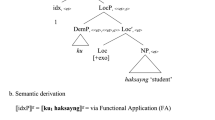Abstract
This paper investigates “gapless” bei passives in Mandarin Chinese and the way they are licensed. It is discovered that if the embedded predicate of a bei passive contains a weak NP, then the bei passive can be gapless. The proposal of this paper is that the weak NP introduces a variable, which can be bound by the operator Op at the embedded IP. Op need not move from an argument position in the embedded predicate of the bei passive; it can be merged directly to the embedded IP and bind the variable introduced by the weak NP.
Similar content being viewed by others
References
Aoun Joseph, Y.-H. Audrey Li. (1993). Syntax of scope. MIT Press, Cambridge
Cheng, Lisa L.-S. 1991. On the typology of wh-questions. Doctoral dissertation, Massachusetts Institute of Technology.
Diesing Molly. (1992) Indefinites. MIT Press, Cambridge
Feng Shengli. (1995) The passive construction in Chinese. Studies in Chinese Linguistics 1: 1–28
Hashimoto Mantaro. (1987) Hanyu beidongshi de lishi quyu fazhan [The historical and geographical development of Chinese passive constructions]. Zhongguo Yuwen 196: 36–49
Huang, C.-T. James. 1982. Logical relations in Chinese and the theory of grammar. Doctoral dissertation, Massachusetts Institute of Technology.
Huang, C.-T. James. 1995. Logical form. In Government and binding theory and the minimalist program, ed. Gert Webelhuth, 125–175. Oxford Cambridge, MA: Blackwell.
Huang C.-T.James. (1999) Chinese passives in comparative perspective. Tsing Hua Journal of Chinese Studies, New Series 29(4): 423–509
Li Charles N., Sandra A. Thompson. (1981) Mandarin Chinese. University of California Press, Berkeley Los Angeles
Lin Jowang. (1998) Distributivity in Chinese and its implications. Natural Language Semantics 6(2): 201–243
Lin T.-H.Jonah. (2005) Notes on the determiner ge and related problems. UST Working Papers in Linguistics 1: 267–294
Liu, Fenghsi. 1990. Scope dependency in English and Chinese. Doctoral dissertation, University of California, Los Angeles.
Milsark, Gary L. 1974. Existential sentences in English. Doctoral dissertation, Massachusetts Institute of Technology.
Tang Sze-Wing. (2001) A complementation approach to Chinese passives and its consequences. Linguistics 39(2): 257–295
Ting Jen. (1998) Deriving the bei-construction in Mandarin Chinese. Journal of East Asian Linguistics 7(4): 319–354
Tsai, W.-T. Dylan. 1994. On economizing the theory of A-bar dependency. Doctoral dissertation, Massachusetts Institute of Technology.
Author information
Authors and Affiliations
Corresponding author
Rights and permissions
About this article
Cite this article
Lin, TH.J. Licensing “gapless” bei passives. J East Asian Linguist 18, 167–177 (2009). https://doi.org/10.1007/s10831-009-9039-y
Received:
Accepted:
Published:
Issue Date:
DOI: https://doi.org/10.1007/s10831-009-9039-y



